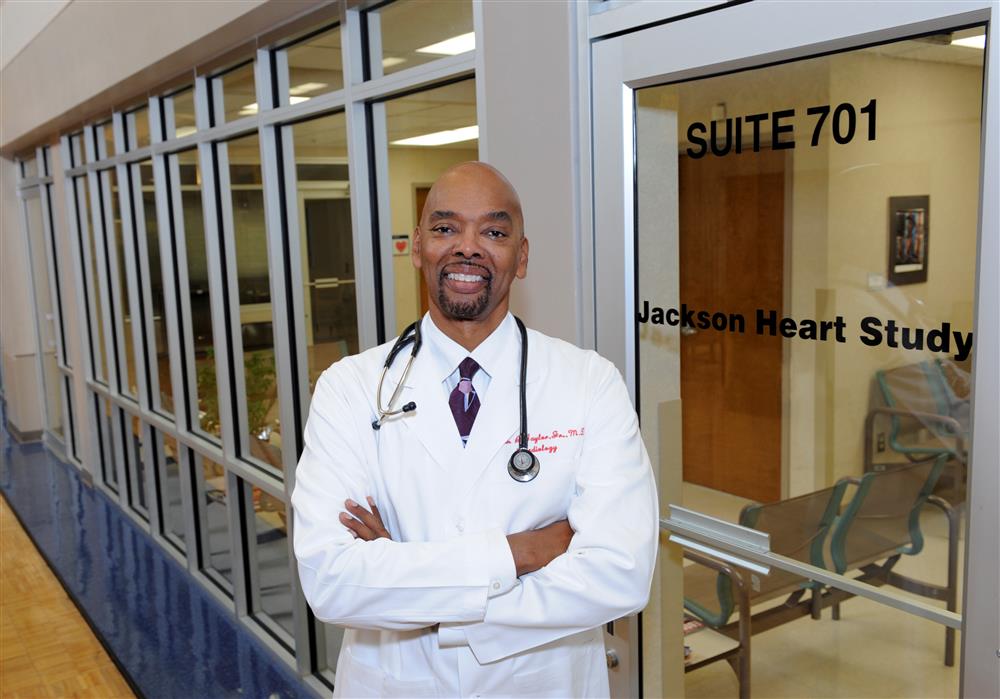Jackson Heart Study celebrates 10 years of improving minority health

A scientific conference featuring experts in heart disease and public health from the nation's top universities and institutes will celebrate the Jackson Heart Study's 10th anniversary during a three-day event beginning Sept. 22.
The Jackson Heart Study Scientific Conference 2010, happening Sept. 23-24 at the Jackson Convention Complex, will both mark progress in understanding disease disparities among African-Americans, and help shape the study for the coming years.
A pre-conference symposium Sept. 22 will help connect young scientists and physicians. A gala reception Sept. 24 at the Jackson Medical Mall will conclude the festivities.
With the theme Toward Resolution of Cardiovascular Health Disparities, the conference will feature speakers from Harvard University, Johns Hopkins University, the National Institutes of Health, Duke University, American Heart Association, Northwestern University and other prominent research institutions.
"All these experts coming to the 10th anniversary conference said 'yes' because they recognize the importance of the study, the data platform and the proverbial gold mine of health information derived from population science," said Dr. Herman Taylor, principal investigator of the Jackson Heart Study.
The Jackson Heart Study is a population study by three longstanding Jackson institutions - University of Mississippi Medical Center, Jackson State University and Tougaloo College - to characterize risks for cardiovascular disease in African-Americans. It is funded by the National Heart, Lung and Blood Institute and the National Center on Minority Health and Health Disparities.
Through numerous medical tests, scans, exams and interviews, JHS has followed 5,300 African-Americans in Jackson. It also analyses lifestyle factors, such as diet and community and church involvement. The study has served as a springboard for community health outreach and given training opportunities to dozens of undergraduate students interested in science, medical and public-health careers.
In the mid-1990s, when the study's building blocks were congealing, African-Americans suffered cardiovascular disease at astounding rates - the very definition of a health disparity - as compared to other ethnic groups.
For example, 40-year-old black women had a likelihood of dying of cardiovascular disease 4.5 times higher than the national average. Rates for black men the same age were three times above the national average. While rates have declined somewhat, they remain disproportionate.
"You had these obscenely skewed statistics that needed investigation," Taylor said. "In the late 1990s African Americans represented, unfortunately, a worst-case scenario for cardiovascular disease."
Too often African-Americans are analyzed as a monolithic, single group, Taylor said. The Jackson Heart Study takes into account diversity in the population. It includes aspects such as community involvement, education levels, income and diet.
Through its first decade the study amassed an impressive collection of achievements.
"We've doubled the number of publications every year for the last three years," Taylor said.
Articles using JHS data appeared in journals such as the American Society of Human Genetics, Psychosomatic Medicine, Circulation, American Journal of Cardiology, Ethnicity and Disease, Journal of the American Dietetic Association, American Journal of Kidney Diseases and others, Taylor said.
A July article by JHS and other researchers published in Diabetes Care could be the first to characterize the risks to the heart and metabolism that pericardial adipose tissue - fat build-up around the heart - pose to African-Americans.
In a paper published in June in Circulation: Cardiovascular Genetics, researchers using JHS data found that out of eight genetic regions associated with lipid-related traits in people of European origin, five locations were also relevant to African-Americans.
The American Journal of Kidney Disease in June published a study that used JHS data to compare socioeconomic status with chronic kidney disease. Researchers found the rate of chronic kidney disease was 41 percent lower in participants with high socioeconomic status.
The Jackson Heart Study is taking on a global reach, Taylor said.
"We are a hub, collaborating with Harvard and its hospitals, Johns Hopkins, University of Alabama, Wake Forest University, Broad Institute, the Mayo Clinic - the major players in epidemiology, genetics, social determinants of disease, obesity and nutrition," he said.
The conference will also provide a meeting point and reunion for the study's impressive alumni group. Dozens of undergraduates from Tougaloo and Jackson State have worked with the study. That exposure has helped produced MDs, scientists and public-health professionals, another aim of the study.
Taylor credited Dr. Dan Jones, now the University of Mississippi chancellor and the study's first principal investigator, for doing the heavy lifting early on with a JHS feasibility study in 1996 and '97.
As well, leadership from Dr. Wallace Conerly, UMMC vice chancellor emeritus for health affairs, former Tougaloo President Dr. Joe A. Lee and former Jackson State President Dr. James E. Lyons Sr. was key to the study's success.
The leaders recruited Taylor, a cardiologist, in 1998 from the University of Alabama to head the new study.
"People have to walk away from this study and this conference knowing there are segments of the population that are unduly stressed with disease," Taylor said.
In addition to the anniversary, this year also marked the founding of a support group for the study, Friends of the Jackson Heart Study. Organized under president Rita Wray, the non-profit group is raising private funds to help support JHS research, training, advocacy and community-service initiatives.
"The Jackson Heart Study is fortunate to be funded through the National Institutes of Health. But federal dollars cannot be spent on certain costs," Wray said.
"Through Friends of the Jackson Heart Study, we provide material support, such as books, supplies and equipment, for student researchers, travel expenses for young faculty dedicated to the JHS mission, community outreach and coverage of other related costs."
- For more information on giving to the Friends group, contact the UMMC Office of Development at (601) 984-2300.
- Tickets for the Gala Reception are available at the Jackson Heart Study office, Suite 701, Jackson Medical Mall, by calling (601) 979-8700 or by e-mailing Dr. Sonja Fuqua at srfuqua@att.net.


